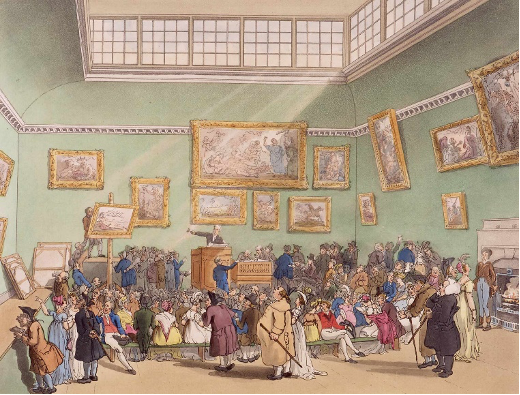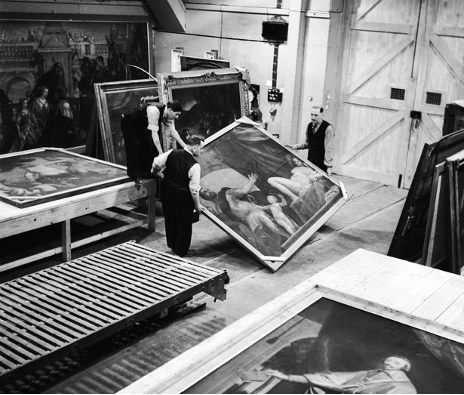Society for the History of Collecting – PhD & ECR Workshop, 17 November 2022
Collections and Impermanence: Transfer, Exchange and Disposal
Images: (left) Thomas Rowlandson, Christie’s Auction Rooms, 1808 (Metropolitan Museum of Art 17.3.1167-146)); (right) A painting by Paolo Vernese is taken out of storage for routine inspection undeground. In the foreground is Cardinal Richelieu by Philippe de Champaigne, 1942, Fred Ramage/Keystone Features/Hulton Archive/Getty Images
The history of collecting is the history of objects on the move. Objects collected travel through space – sold, transferred, exchanged, loaned, gifted and stolen throughout the world. They also travel through time – inherited, disposed, restored and destroyed. Each of these transitions gives objects new identities and meaning, while other aspects of their histories become obscured and erased.
The International Council of Museums is debating the various aspects of what defines a museum (an institutional collection), with the definition of museums as ‘permanent’ remaining uncontested. But can collections really be called permanent? Within recent scholarly research, the intrinsically mobile and circulatory nature of collections is coming more sharply into focus. Collecting and Impermanence: Transfer, Exchange and Disposal will examine and pursue further this avenue of mobility and circulation. It will question how moving beyond a preoccupation with collections’ accumulative aspects changes how the history and future uses of collected objects can and should be reinterpreted.
The event will encourage conversation about the history of collecting across a variety of material types and disciplines, with a focus on objects that have left private and/or public collections, rather than those accumulated or acquired. At a time of heightened public attention to the return of objects coercively taken as war plunder, prize or loot from their country of origin, this focus holds immediate relevance and urgency. Taking transfer, exchange and disposal as our themes, the workshop seeks to stimulate further discussions about the fluidity of European collections in contrast to the permanence or stasis typically associated with them. We encourage proposals from PhD and ECR scholars researching the history of collecting in its broadest sense, addressing all kinds of collections (both historical and contemporary) and material types – from fine art to fossils, books to antiquities, prints and drawings to plants.
We invite 200-word abstracts for twenty-minute papers that explore the themes of transfer, exchange and disposal in relation to any aspect of collecting, whether by private individuals or public institutions, ranging from any time in the past to the present day. Topics might include:
- Auctions and sales
- Conservation, catalogues and collections management
- Spoliation and disputed histories
- Agents, dealers and go-betweens
- Restitution and return of cultural heritage
- Lost, stolen or destroyed objects within collections
- Practices of transfer and exchanges between collections and collectors
- Duplicate collections
- The transactional nature of collections
- Loans and exhibitions
- Display, labels and interpretation
Please send abstracts to Will Burgess c/o info@societyhistorycollecting.org with the subject line ‘CFP – PhD/ECR workshop’. Deadline 12 August 2022.
The workshop will be held in person in London as a hybrid event. Unfortunately, we cannot provide funding for speakers’ travel. As such, we will arrange for papers to be given online during the session for those not based in London.



I invite your members and participants to a related symposium I have organized for the National Association of Watch and Clock Collectors. “Horology’s Great Collectors” will be in October in New York City and feature an international roster of eminent speakers. Registration fees can be waived for students and young scholars and curators.